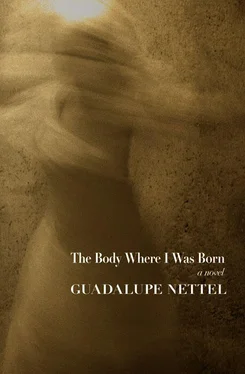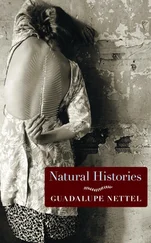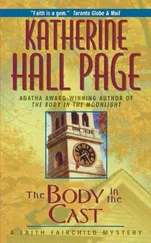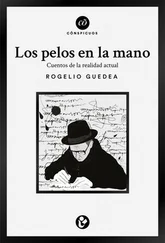Avenue Insurgentes marked the eastern edge of the complex, and to the west was a sports club located in the same spot the 1968 Olympic Games took place years earlier. The facility included a running track and a hundred-meter pool. There was also a pyramid in the complex, a church — a synagogue would have better matched the makeup of the neighborhood — and a state supermarket of enormous dimensions for the time.
Of all the nooks and crannies, my favorite place was a tree right in front of my building, whose branches reached up to the apartment where we lived. It was a very old Peruvian pepper tree rooted in a mound of volcanic rocks. The width of its trunk and density of its leaves made it a spectacular tree. When I climbed it, I felt challenged and at the same time sheltered. I was sure that this tree would never let me fall from its branches, and so I climbed to the highest one with a calmness admirable to anyone watching from below. It was a sanctuary where I did not have to curve my spine to feel safe. At that age, I felt a constant need to defend myself from my environment. Instead of playing with the other kids in the plaza, I spent my afternoons with the drying racks up on the rooftops, where nobody ever went. I also preferred to reach our fifth-floor apartment by taking the back staircase instead of risking getting stuck in the elevator for hours with some neighbor. In that sense — much more than in any physical respect — I really did resemble the cockroaches that travel through the marginal spaces and buried pipes of buildings. It was as if, at some point, I had decided to build an alternative geography, a secret territory within the complex, through which to move about as I pleased, unseen.
One of my mother’s sisters, the one who visited us more often than the others, and for whom I had always felt a special fondness — she was an exceptionally sensitive woman, a lover of the grotesque and the scatological, of Borges’ poetry, Rabelais’ novels and Goya’s paintings — invented a tale inspired by my surreptitious behavior, which she would tell us at night after reading from the children’s edition of Gargantua y Pantagruel . Her story described the adventures of Perla, a very pretty girl who suffered from terrible constipation. One afternoon, her parents set off to the grocery store for a few hours and Perla decided to remain on her potty until she could expel all the stool she has stored up in her body. Moved, perhaps, by the marvelous silence throughout the house, or by the relaxed and pleasant sensation of being alone, the poop began to come out, at first one piece at a time like little rabbit droppings, then like bland meatballs of considerable size until they spilled over the sides of the plastic receptacle on which Perla sat.
“Plop, plop,” sounded the poop falling in the middle of the afternoon. The feces rolled into the bedrooms, invaded the apartment, and began to flow like a stream down the stairs of the building, then onto the sidewalks, into the courtyards of the housing complex—“Plop, plop!”—and soon it reached Avenue Insurgentes, only to flow inevitably across the entire city. The story of Perla can be seen as a cautionary tale, for it describes the situation that has come to characterize our beloved Mexico City, overcome today by faulty sewage lines and garbage dumps.
The staircase in my building had a hand in my education that my parents never imagined. It was a cool and isolated spot, with just enough light coming through a few glass-block windows. There, almost by chance, I made an important discovery about my body. It happened during one of those very hot vacation days. One of my favorite games was to leap up the clay steps two at a time and slide down the iron handrail. It was something I had done often, always innocuously. But that afternoon, for some reason I couldn’t explain, the sensation felt surprisingly pleasurable. It was like a tickle just above my thigh that needed to be felt again and again, faster and faster. Everything was at contrast: the feeling of being hidden, shielded from eyes, and still in danger of someone finding me engaged in a game that somehow seemed wrong. The coolness of the rail and the heat of the friction sent an addictive shiver through my body. In seconds, those feelings opened up the gates to the heavenly world of masturbation. It was like reaching an alternate dimension or discovering a psychedelic substance. In that moment, my parents’ long and boring lectures about the purpose of sex were the furthest thing from my mind. So much so, that one afternoon I innocently revealed to my mother why I spent so much time in the service stairwell, and to my surprise — and probably to yours too, Dr. Sazlavski — she didn’t think it was a good idea for her daughter to masturbate in such an open place where no one ever went, even though I was doing it fully dressed while pretending to play a game. Her reaction was much closer to shame than celebration. As if what I was doing was something bad, she asked me to do “that” only in the bedroom, which of course I shared with my little brother. That’s how, with the seventies in full swing, I joined the ancestral order of closet masturbators, that legion of children who rarely peak their heads out from under the sheets. But still, I should admit that I didn’t completely obey. I returned to the stairs many more times than my mother ever imagined, being extra careful that no one caught me in my refreshing ritual. It surprises me still to remember the things that excited me in those early years. It was unpredictable things like words, intonations in a voice, or watching a public display of affection, but also certain sounds like the whistle of the man who sold sweet potatoes or of the man who sharpened knives. All these little nothings were calls that sent me running to the handrail or my bedroom. Sometimes I see puppies who when presented with any chance of friction will publically yield to their own expectant pleasure. That was me when I was seven years old, a little girl with an unbridled carnal appetite who would succumb to a kind of desire for furniture, armchairs, the edge of a table, the front rim of the sink, or the metal poles of the swing set.
Even though no one told me, it wasn’t long before I understood that sex was not only something pleasurable like chocolate; it was also a means to hurt someone, deeply and determinately. It was my childhood habit of listening through closed doors that led to this discovery. One afternoon, our neighbor from the last apartment on the fourth floor came to visit. She was the mother of two girls who lived downstairs from us in a clean and very organized apartment with enormous fish tanks that I still remember. Her daughters were beautiful Argentine girls with dark hair and intensely blue, catlike eyes. On several occasions we had crossed paths in the plaza and shared friendly but shy exchanges. It goes without saying that our building complex, with its seemingly bucolic gardens, also had a macabre and at times dangerous dimension. As I said before, our unit had housed the athletes of the ’68 Olympics. That time and those games constitute, as the whole world knows, the symbol of the worst massacre committed in Mexico and the start of the wave of repression that characterized the continent through the next decade. And yet, as paradoxical as it might seem, these buildings were full of leftist South Americans who had come to Mexico to escape being assassinated in their own fascist countries, as my mother explained to us in a solemn tone. Back to our neighbor: I remember that on this occasion she looked haggard. My mother was very sweet with her, sat her down in the living room and offered her tea, then sharply told me to go to my room. Bit by bit, between sobs and from the clipped phrases I was able to pick up from the hallway, our neighbor explained how the day before, in the same garden where I often gave my dolls baths, a janitorial worker had abused her daughter Yanina in broad daylight. I didn’t understand what had happened, but I knew the man had done something horrible and irrevocable to the girl. I also understood that despite all her pain the woman had come to tell my mother to be extra careful, to watch out so the same thing wouldn’t happen to me. When our neighbor left, I tried to coax more information out of my mother, but she changed the subject. There was no human power that could convince her to explain what had happened to the girl from downstairs. It wasn’t until nighttime, when my dad came home from the office and my parents thought my brother and I were asleep, that my mom told the story in full and I was able to pick up a few details. My dad agreed that it was best not to tell us anything, but they would accompany us to the plaza from then on. I was up all night crying and thinking about Yanina and how terrible sex could be, scared of suffering something similar. It was the first time I encountered a taboo, and I do understand why it went this way, but I would like you to tell me, Dr. Sazlavski, isn’t the effect of silence much worse on children who are used to asking and knowing about everything? Wouldn’t it have been better to tell us about the dangers lurking close-by? Or at least more pertinent than sowing confusion about things that have nothing to do with the day-to-day life of a seven-year-old? Yanina was never the same. Once a flirtatious and exceedingly feminine girl, she began to hide beneath baggy clothing and a scowl. A few months later, she cut her hair like a boy’s and started to gain weight, as if she wanted to cover the prematurely developed shape of her body with fat. A few months after that, her family moved to a smaller, safer housing complex.
Читать дальше












